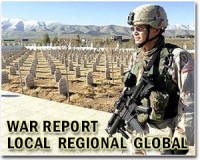| . |  |
. |
United Nations (AFP) Jan 30, 2011 Palestinians are pressing the UN Security Council to pass a simmering resolution that they say attacks the "cancer" of Israel's occupied-territory settlements but which many diplomats see also targeting the United States. The deadlocked Israeli-Palestinian peace process was not mentioned in President Barack Obama's State of the Union speech this week and the Palestinians and others want to know what the US Middle East strategy is. They feel "abandoned," said one diplomat at the UN headquarters. The resolution, now before the council's 15 members and waiting for Arab foreign ministers to set the date to press for a vote, condemns Israeli settlements in the West Bank and East Jerusalem. That is the policy of the United Nations, United States and most countries in the world. But US Secretary of State Hillary Clinton has opposed the resolution, while insisting that the peace process remains the "number one" US priority. Diplomats say the US administration will use its veto privilege as one of five permanent members of the Security Council, keeping up its traditional defense of Israel. Palestinians have rejected US-brokered talks with Israel since Prime Minister Benjamin Netanyahu refused to extend a settlement moratorium that expired on September 28. Riyad Mansour, Palestinian envoy to the United Nations, called the thousands of new Israeli homes planned in the occupied territories "a cancer that is overtaking the body of the West Bank." "If we don't have a surgical operation to remove the tumor and to stop it from growing then there will be no chance of the survival of the body that contains such cancer cells," he told AFP in an interview, insisting that the resolution could unblock the peace process. He also highlighted frustration with the US government, the pillar of any peace deal. The United States should "show leadership by putting their cards on the table as exactly what they want to accomplish in the next nine months," Mansour later told reporters. A US veto now would cause problems all around. The United States is part of the diplomatic Quartet -- with the United Nations, European Union and Russia -- which has set September as a deadline for a framework accord on a Palestinian state. Obama told the UN General Assembly last September that he believed there could be a new member, Palestine, in a year. Western diplomats hope that the Arab states will wait until after a Quartet meeting -- with UN Secretary General Ban Ki-moon and Clinton -- in Munich on February 5 before calling a vote. That meeting could produce some ideas to reassure the Palestinians. The UN diplomat said the Palestians want "a clearer idea of what the American strategy is on the peace process between now and September. "And they are looking to the Americans, either publicly or privately or multilaterally through the Quartet to set out in a little bit more concrete terms what is the process they are now planning," the diplomat said. "We just don't know what the American strategy is, or whether they have one," commented another, also speaking under condition of anonymity. The resolution "probably says more about the absence of a US strategy than it does about the reasons for the Palestinian move," according to Khaled ElGindy, a former advisor to the Palestinian leadership and now a fellow Brookings Institution think tank in Washington. "The Americans tried and failed to get even the most limited stop to settlements. This is the Palestinians saying that the Americans are not living up to their side of the bargain. "The Palestinians rely on the US to deliver Israel and if they can't do that on something as small as settlements how can they do it on the bigger issues" -- permanent status, borders and the future of Jerusalem, the expert asked.
Share This Article With Planet Earth
Related Links
 Files show firmer Palestinian line on talks in 2010
Files show firmer Palestinian line on talks in 2010Ramallah, Palestinian Territories (AFP) Jan 28, 2011 Position papers given to AFP show Palestinian negotiators took firmer stances on final status issues in June 2010 than those detailed in documents leaked by Al-Jazeera. The papers, shown to AFP on Friday by a senior Palestinian official on condition of anonymity, purportedly contain the negotiating position the Palestinians laid out ahead of direct talks with Israel in September 2010. Th ... read more |
|
| The content herein, unless otherwise known to be public domain, are Copyright 1995-2010 - SpaceDaily. AFP and UPI Wire Stories are copyright Agence France-Presse and United Press International. ESA Portal Reports are copyright European Space Agency. All NASA sourced material is public domain. Additional copyrights may apply in whole or part to other bona fide parties. Advertising does not imply endorsement,agreement or approval of any opinions, statements or information provided by SpaceDaily on any Web page published or hosted by SpaceDaily. Privacy Statement |